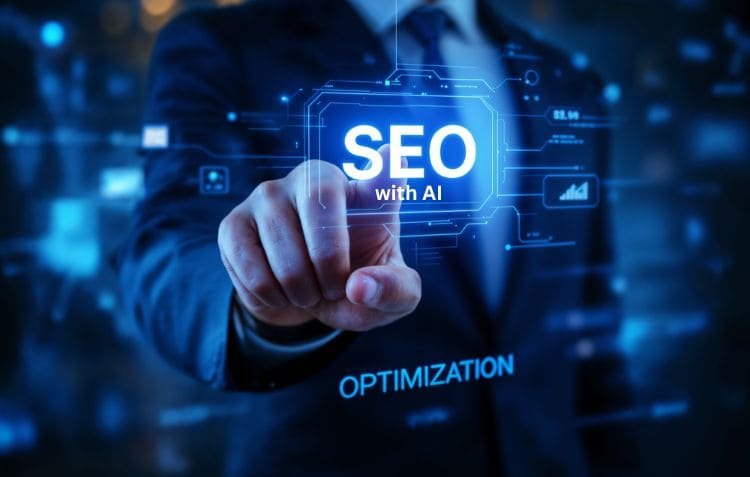How to Use AI for SEO Gravitate & Dominate Google
Artificial Intelligence (AI) is transforming the way businesses approach Search Engine Optimization (SEO). A study by BrightEdge reveals that 60% of marketers already leverage AI to enhance their SEO strategies, and this number is expected to rise. As search algorithms become more sophisticated, AI-powered tools help websites gravitate toward higher rankings and dominate Google.
So, how can you use AI for SEO to gain a competitive edge? The answer lies in leveraging AI for keyword research, content optimization, technical SEO, and predictive analytics. AI streamlines complex SEO tasks, providing faster insights, better accuracy, and improved user experience, all of which contribute to ranking success.
In this article, you’ll learn how to use AI for SEO gravitate, covering the latest AI-powered techniques, case studies, and actionable strategies. Whether you’re a beginner or an expert, AI can supercharge your SEO efforts—let’s explore how.
Understanding AI in SEO & How to Use AI for SEO Gravitate
AI is revolutionizing SEO by automating complex tasks, analyzing search intent, and optimizing content for better rankings. With Google’s algorithms evolving, AI-powered tools have become essential for data-driven decision-making and improving search visibility.
Defining AI and Its Role in SEO
Artificial Intelligence (AI) refers to machines mimicking human intelligence to process data, recognize patterns, and make informed decisions. In SEO, AI is used to analyze vast amounts of search data, user behavior, and content performance to enhance optimization strategies.
AI-driven tools like Google’s RankBrain, GPT models, and machine learning algorithms refine search rankings by understanding context, intent, and relevancy. Businesses leverage AI for keyword analysis, content creation, voice search optimization, and automated audits, making SEO more efficient and data-driven.
Evolution of SEO with AI Integration
Traditional SEO relied on manual keyword research, backlink building, and content optimization. However, AI has automated and refined these processes by offering predictive analytics, AI-powered recommendations, and real-time ranking insights.
With AI, SEO strategies have shifted towards natural language processing (NLP), sentiment analysis, and hyper-personalization, allowing businesses to deliver high-quality, user-focused content that aligns with Google’s evolving algorithms.
AI-Powered Keyword Research
Keyword research is the foundation of any successful SEO strategy, and AI is transforming how marketers discover and optimize keywords. AI-powered tools can analyze search trends, user intent, and competition levels more efficiently than manual methods, helping websites gravitate toward higher rankings on Google.
Enhancing Keyword Discovery
AI tools such as SEMrush, Ahrefs, and Google’s AI-driven Keyword Planner analyze massive datasets to identify high-performing, low-competition keywords. Unlike traditional keyword research, which relies on manual input, AI predicts emerging search trends by processing historical search data, user behavior, and search intent signals.
Through Natural Language Processing (NLP) and machine learning, AI understands semantic relevance and suggests related long-tail keywords that align with conversational search patterns and voice search queries. Additionally, AI helps refine keyword clusters by analyzing search volume, competition, and ranking difficulty, allowing businesses to optimize their content more effectively.
Case Study: AI in Keyword Optimization
A case study from HubSpot highlights how AI-driven keyword research boosted organic traffic. By integrating AI-powered keyword analysis, HubSpot identified untapped search queries and optimized content using predictive analytics. This strategy led to a 42% increase in organic traffic and improved ranking positions for competitive keywords.
AI enables businesses to target the right audience with precision, enhance search visibility, and stay ahead of SEO trends. Implementing AI-powered keyword research ensures a data-driven, future-proof SEO strategy that aligns with evolving search algorithms.
Content Creation and Optimization with AI

AI is reshaping content creation by enhancing efficiency, relevance, and SEO performance. From generating high-quality articles to optimizing existing content, AI-driven tools help businesses gravitate toward top rankings on Google by aligning content with user intent and search algorithms.
AI-Generated Content
AI-powered writing tools like ChatGPT, Jasper, and Copy.ai assist in generating SEO-friendly content quickly. These tools analyze search trends, keyword intent, and competitor data to produce structured, relevant, and engaging articles.
Benefits of AI-generated content:
- Speed & Efficiency: AI can create drafts in minutes, streamlining content production.
- SEO Optimization: AI tools incorporate semantic keywords, NLP-based phrasing, and readability improvements for better ranking.
- Personalization: AI tailors content to user preferences, search intent, and trending topics.
However, AI-generated content requires human refinement to maintain originality, authenticity, and alignment with Google’s E-E-A-T guidelines. Businesses should blend AI efficiency with human expertise for the best results.
Optimizing Existing Content
AI doesn’t just create content; it enhances existing pages by analyzing readability, keyword density, structure, and engagement metrics. Tools like SurferSEO, Clearscope, and Frase evaluate content performance and suggest improvements such as:
- Keyword optimization to match search intent.
- Content restructuring for better flow and readability.
- Internal linking & metadata enhancements for improved indexing.
AI-driven content audits help businesses refresh underperforming articles, boosting rankings and engagement.
Case Study: AI in Content Strategy
A case study from Neil Patel’s Ubersuggest demonstrates how AI-powered content optimization increased organic traffic. By leveraging AI analytics, a company identified content gaps, improved readability, and refined keyword strategies, leading to a 35% boost in search visibility and higher engagement rates.
Integrating AI into content strategy ensures businesses stay competitive, creating high-quality, user-focused, and search-optimized material that dominates search results.
Technical SEO Enhancements through AI
Technical SEO plays a crucial role in ensuring a website meets search engine standards for performance, structure, and usability. AI-driven tools help businesses gravitate toward better rankings by automating and improving various technical aspects.
Website Performance Optimization
Search engines prioritize fast, mobile-friendly, and user-friendly websites. AI tools like Google PageSpeed Insights, NitroPack, and Cloudflare analyze and enhance:
- Page Speed: AI detects slow-loading elements and optimizes code, images, and server response times.
- Mobile Responsiveness: AI-powered audits identify UX issues on different devices and recommend fixes.
- User Experience (UX): AI analyzes user behavior and provides data-driven improvements to reduce bounce rates and increase engagement.
A study by Google found that 53% of mobile users abandon a site if it takes longer than 3 seconds to load. AI-driven performance enhancements ensure seamless experiences, improving both SEO rankings and user satisfaction.
Structured Data Implementation
AI simplifies the process of adding structured data (schema markup), which helps search engines understand and display rich snippets like FAQs, reviews, and product details. Tools like Merkle Schema Markup Generator and Rank Math AI assist in:
- Generating Schema Markup based on content type.
- Ensuring Proper JSON-LD Formatting for Google’s structured data guidelines.
- Automating Implementation & Validation to prevent errors.
By integrating AI for structured data, businesses can enhance search visibility, increase click-through rates (CTR), and improve content discoverability in rich results.
AI in SEO Analytics and Reporting

AI-driven analytics tools provide deeper insights into SEO performance, helping businesses make data-backed decisions and optimize strategies in real time.
Advanced Data Analysis
Traditional analytics tools require manual interpretation, but AI automates and simplifies complex SEO reports. Platforms like Google Analytics 4, SEMrush AI, and Ahrefs AI use machine learning to:
- Identify SEO gaps & ranking opportunities based on user search behavior.
- Analyze competitor strategies and suggest improvements.
- Detect content & backlink performance trends to refine strategies.
These insights help businesses prioritize high-impact optimizations, improving search rankings and engagement.
Predictive Analytics
AI-powered predictive analytics forecasts future SEO trends, allowing businesses to adjust strategies proactively. By analyzing historical data, search trends, and user behavior, tools like MarketMuse and Clearscope help:
- Predict keyword trends & content topics before they gain traction.
- Optimize for upcoming algorithm changes using AI-based insights.
- Refine content calendars based on search demand predictions.
A study by HubSpot found that businesses leveraging AI for SEO analytics saw a 30% improvement in organic traffic due to better forecasting and data-driven optimizations.
Ethical Considerations and Best Practices
As AI becomes integral to SEO strategies, maintaining ethical standards and content integrity is essential. While AI offers efficiency, businesses must ensure compliance with Google’s guidelines to uphold credibility and trustworthiness.
Maintaining Content Authenticity
Google’s E-E-A-T (Experience, Expertise, Authoritativeness, and Trustworthiness) framework prioritizes human-centric, value-driven content. AI-generated content must be:
- Factually accurate: Verified with authoritative sources.
- Expert-driven: Reviewed by professionals to ensure credibility.
- Contextually relevant: Tailored to user intent rather than keyword stuffing.
Human intervention is essential to refine AI-generated drafts, inject expertise, and ensure compliance with Google’s policies. Ignoring these aspects can lead to ranking penalties or manual actions.
Avoiding AI Overreliance
While AI enhances SEO, over-dependence can lead to generic, low-value content that lacks human touch. Best practices include:
- Human Oversight: AI-generated content should be reviewed, edited, and fact-checked before publishing.
- Personalized Insights: AI should assist, not replace, human creativity and strategic thinking.
- Strategic AI Use: Leverage AI for data analysis, research, and optimization while maintaining human-driven storytelling.
Balancing automation with human expertise ensures ethical, high-quality content that resonates with both search engines and users.
Conclusion
Integrating AI into SEO strategies provides powerful advantages in keyword research, content creation, technical enhancements, and data analysis. Businesses that leverage AI-driven tools effectively can boost search rankings, improve user experience, and optimize content with precision.
However, AI should be used responsibly and ethically. Maintaining content authenticity, human oversight, and compliance with Google’s guidelines is crucial to sustaining long-term SEO success.
AI can streamline processes, but the human element remains irreplaceable in crafting engaging, authoritative, and trustworthy content that ranks well and builds audience trust.
FAQs
What is AI’s role in SEO?
AI enhances SEO by analyzing data patterns, predicting trends, and automating tasks like keyword research and content optimization, leading to improved search rankings.
Is it ethical to use AI for SEO?
Yes, when used responsibly. AI serves as a tool to assist SEO specialists but requires human oversight to ensure content quality and ethical standards.
How does AI improve keyword research?
AI-powered tools analyze vast amounts of search data to identify high-impact keywords and predict emerging trends, enhancing the effectiveness of SEO strategies.
Can AI generate SEO-friendly content?
Yes, AI can assist in creating content optimized for search engines by analyzing search intent and suggesting relevant topics and structures.
How does AI assist in technical SEO?
AI tools help optimize website performance by analyzing site speed, mobile responsiveness, and user experience, contributing to better search engine rankings.






